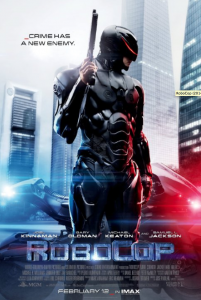
 There was a robotic elegance to the way the original RoboCop moved. Played by Peter Weller in the 1987 first film, care had been taken to give the movements of the mechanical hero precision. This was accomplished through hard work with famous mime and master drama teacher Moni Yakim. And the lack of such elegance is one of the main problems with this efficient and broadly entertaining “RobCop” remake.
There was a robotic elegance to the way the original RoboCop moved. Played by Peter Weller in the 1987 first film, care had been taken to give the movements of the mechanical hero precision. This was accomplished through hard work with famous mime and master drama teacher Moni Yakim. And the lack of such elegance is one of the main problems with this efficient and broadly entertaining “RobCop” remake.
The story of “RoboCop” is pretty well known to seasoned movie goers. Tough Detroit boy-scout cop Alex Murphy runs afoul of some connected criminal types and is viciously rubbed out. He is then transformed into the title character. His brain is rewired and he is fitted with armor and a full complement of weapons. Then he’s turned loose on the crime ridden city of Detroit. This is where he again runs into trouble with connected criminals, some of which are being protected by the very people who created his robotic identity.
In this version, as you can tell from the trailers, Murphy (played by Joel Kinnaman) is blown up. Unlike the 1987 movie, in which Murphy is shot over and over causing parts of his body explode vividly, here we get a wider shot revealing body damage and burns. It is all calculated to achieve the coveted PG-13 rating. And while my 12 year old will dig it, die hard fans of the R-rated original will find the entire movie soft and lacking in the kind of edgy satire that launched the franchise (as pitiful as it ultimately became).
“RoboCop (2014)” is decidedly more political than its predecessor. And this is where it gets things right. Samuel Jackson (not to be confused with Laurence Fishburne) plays a conservative talk show host who has zealously made it his mission to put robot cops on the streets of American cities. The film’s single best idea is the human vs. machine conflict. Debated heavily is a law prohibiting the use of complete robotic officers in the US. We see their effective use in other parts of the world (particularly in developing countries).
Jackson, playing host Pat Novak, appears in a television studio in which he interviews and berates guests that his finds reprehensible. And the performance single handedly lifts the entire production. Like the 1987 version, whenever the RoboCop story gets sappy or slow, the action shifts to television commercials, in this case Novak, for direction, edge, humor and verve. And the tone stuck when Jackson chews up his scenes is enough to recommend the film.
Surprisingly, what doesn’t work as well are the action sequences. Where the original RoboCop showed off his crime fighting skills brutally and with pin-point precision, this version operates in a world not too much removed from our own. And that is limiting and relatively humorless. Because the narrative is closely tied to the legal struggles of OmniCorp and its ambitious CEO Raymond Sellers (Michael Keaton), it is forced to play by rules of combat that limit what RoboCop can do. Gone is the relentless one man judge, jury and executioner that made the original so tough and note-worthy. “RoboCop (2014)” plays less like a satire and more like an action film with science fiction elements. If not for Jackson’s turn and political wrangling, the movie would be indistinguishable from any other actioner.
And in an attempt to play to the action elements, a robot controlling mercenary named Rick Mattox (Jackie Earle Haley) is introduced. Aside from some amusing banter, however, Mattox is given little to do but occasionally get in the way. This is wasted opportunity. Haley’s comeback as an interesting character actor is complete here and he even flexes a bit of his pint-sized muscle. His character wears an exoskeleton that one would think would permit him to go-toe-to-toe with RoboCop. Sadly, this never happens, and in fact, we never get to see what the little suit he wears does for him in the field. Maybe it allowed him to control the other robots. Who knows?
But for the most part, the other technology elements on display are impressive. Unlike the original, Alex Murphy is “saved” by Dr. Dennett Norton (an excellent Gary Oldman) who struggles with the ethical decisions he has to make. And one of those decisions reduces the flesh and bone of Murphy to a minimal degree. He is alive, but it is something little more than a brain and some basic organs. And the effects that show this transformation are convincing.
By keeping Murphy alive, pathos is played up as he attempts to rejoin his family and connect with his young son. Again, this sentimentality undermines the hard edge of the original, but certainly sets it apart paving the way for that PG-13 rating and even a little bit of drama that the original lacked.
It is clear that Brazilian director Jose Padilha is going for a broader audience with his RoboCop version which avoids the irreverent approach taken by Paul Verhoeven in the 1980s. And this version is a sign of the times. Ironically, in this century, video games have gotten more adult and violent whereas mainstream movies have become less so. And it is worth noting that even in 1987, “RoboCop” was not aimed at the mainstream, not initially. When it hit big, making more than $50 million from a reported budget of $13 million, attempts were made to market the film broader. This ultimately brought the property to television where it was ruined. Luckily, that is not what we have here in 2014.
Hardly a better film than the one that inspired it, “RoboCop (2014)” is still the best handling of the material since 1987.
